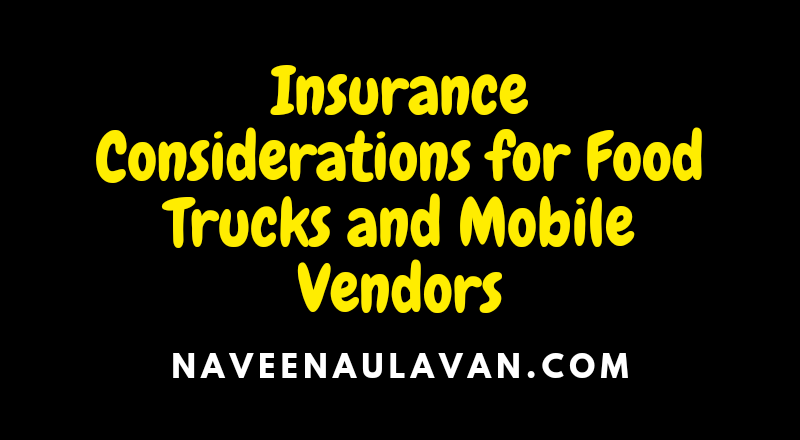Food trucks and mobile vending have become increasingly popular in recent years offering a convenient and often unique dining experience for customers. However like any business it is important for food truck and mobile vendors to protect themselves and their investments by having adequate insurance coverage. In this article we will discuss the key insurance considerations for food trucks and mobile vendors.
General Liability Insurance
General liability insurance is essential for any business including food trucks and mobile vendors. It provides coverage for bodily injury and property damage claims that may arise from your business operations. For example if a customer slips and falls while visiting your food truck general liability insurance would cover the medical expenses and legal costs associated with the incident.
It’s important to note that general liability insurance typically doesn’t cover product liability claims. Therefore it’s advisable for food trucks and mobile vendors to also consider product liability insurance. This coverage protects against claims arising from foodborne illnesses or other injuries caused by the food you serve.
Commercial Auto Insurance
Since food trucks and mobile vendors are constantly on the move commercial auto insurance is crucial. This type of insurance covers damages to your vehicle and third-party liabilities resulting from accidents. It also typically provides coverage for theft vandalism and other types of damage.
It’s important to accurately assess the value of your food truck and any attached equipment when purchasing commercial auto insurance. Keep in mind that some insurance providers may require specific safety features or certifications for your vehicle to be eligible for coverage.
Property Insurance
Property insurance helps protect your physical assets such as your food truck kitchen equipment and inventory. This coverage applies to losses and damages caused by fire theft vandalism and other covered perils. Property insurance can also be extended to cover off-premises events such as catering or festivals.
When selecting property insurance ensure that you accurately estimate the value of your equipment and inventory. It’s also advisable to understand the policy’s coverage limits deductibles and any exclusions.
Business Interruption Insurance
Business interruption insurance provides coverage for lost income and ongoing expenses in the event your food truck or mobile vending business is temporarily unable to operate due to a covered peril. For example if your food truck is damaged in a fire and needs repairs business interruption insurance would help compensate for the lost income while you’re unable to serve customers.
This type of coverage is particularly important for food trucks and mobile vendors as they heavily rely on daily operations for revenue. Business interruption insurance helps mitigate the financial impact of unexpected disruptions and allows you to get back on track quickly.
Workers’ Compensation Insurance
If you have employees working in your food truck or mobile vending business you may be required by law to carry workers’ compensation insurance. This coverage provides medical benefits and wage replacement for employees who suffer work-related injuries or illnesses.
Workers’ compensation insurance is essential in protecting both your employees and your business. It helps cover medical expenses lost wages and legal fees that could arise from workplace accidents or illnesses.
Additional Considerations
In addition to the primary insurance coverages mentioned above food trucks and mobile vendors may also need to consider the following:
1. Non-Owned and Hired Auto Liability Insurance: If you occasionally rent vehicles or use personal vehicles for business purposes this coverage protects you against liabilities arising from accidents involving those vehicles.
2. Umbrella Insurance: Umbrella insurance provides additional liability coverage that goes above and beyond the limits of your primary insurance policies. It can be particularly valuable for food truck and mobile vendors who may face higher liability risks due to the nature of their operations.
3. Food Contamination Insurance: As a food-related business the risk of contamination or spoilage is present. Food contamination insurance provides coverage for losses due to contaminated spoiled or recalled food products.
4. Cyber Liability Insurance: If you accept credit card payments or store customer information electronically cyber liability insurance protects against data breaches hacking and related liabilities.
Conclusion
Ensuring proper insurance coverage is vital for food truck and mobile vendors. General liability insurance commercial auto insurance property insurance business interruption insurance and workers’ compensation insurance are all key coverages to consider. Additionally depending on the specific needs of your business you may need to explore additional insurance options such as non-owned and hired auto liability insurance umbrella insurance food contamination insurance and cyber liability insurance. By adequately protecting your business you can focus on serving delicious meals to your customers without worrying about unexpected risks and liabilities.
